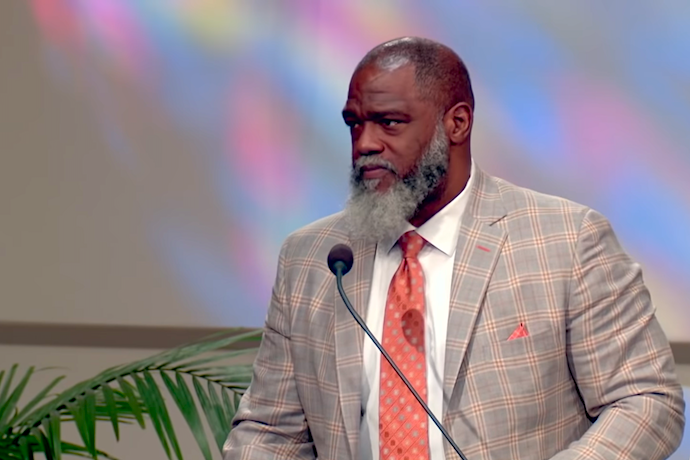On March 4, news broke that African Christian University dean Voddie Baucham was asked to accept a nomination to be President of the Southern Baptist Convention (SBC), the largest Baptist denomination in the world—a denomination also in the spotlight at the moment due to revelations of widespread systemic abuse. Eighteen days later, the right-wing Conservative Baptist Network announced they were also nominating Baucham for President of the SBC’s Pastors Conference. These nominations immediately provoked controversy in Baptist and other circles, beginning with Baptist News Global’s Rick Pidcock arguing 3 days later on March 7 that Baucham is “a threat to children, women and daughters.”
Pidcock’s allegations, which were well-documented, caused reverberations throughout Baptist communities to the point that Ed Litton, the current President of the SBC, weighed in. On March 9, Litton tweeted a statement by Calvary Church pastor Willy Rice defending Baucham as a “brother in Christ” and describing Pidcock’s article as “unnecessary, unloving, and harmful.” Litton added that the allegations against Baucham were “baseless attacks.”
Baucham’s nominations also caused significant concern in another growing community: evangelical homeschool alumni. This is a community I know intimately, as I was personally homeschooled by evangelical parents, kindergarten through high school graduation. I also co-founded Homeschoolers Anonymous, a viral website and social media platform that publishes the stories of other homeschool alumni.
In evangelical homeschooling, Baucham is both famous and notorious. In fact, Baucham began his career as a public speaker and conservative firebrand in the evangelical homeschooling world. There, Baucham is well-known as a social and political extremist, for which evangelical homeschoolers love him. At majority-white evangelical homeschooling events, Baucham is often the token Black conservative sanctioning the white supremacy and Christian Nationalism ubiquitous in the community.
Voddie Baucham and evangelical homeschooling
To better understand Baucham, we should first turn to his history in evangelical homeschooling. Among homeschoolers, Baucham is known as an advocate for extremist ideologies and movements like Quiverfull, Christian Patriarchy, the Family-Integrated Church, and the Stay-at-Home Daughter (SAHD) Movement. For years he taught at homeschool conventions around the United States, advocating for his ideal of the Christian family. In 2008, another evangelical homeschool leader said Baucham was “the most sought-after homeschool conference speaker around the country.”
Family is probably the most significant concern for Baucham—and his thoughts on family, parenting, and child development are what make him so polarizing. Family is also what attracted Baucham to male supremacist Doug Phillips and his homeschool organization Vision Forum in the 2000s, before Phillips was accused of sexual predation by his young Latina nanny and Vision Forum folded in the 2010s.
Family is so important to Baucham because of his own childhood. In his 2009 book What He Must Be If He Wants To Marry My Daughter, he explains that, “All I ever knew was fatherlessness.” He says his father left him and his teenage mother to pursue a football career. Though his mother was a Buddhist, Baucham converted to evangelical Christianity in college. He would go on to study apologetics and theology at Houston Baptist University as well as Southwestern and Southeastern Baptist Theological Seminaries. Haunted by his fatherless childhood, Baucham says, he is now motivated “to train a generation to follow hard after God in spite of what their forefathers have done.”
But Baucham isn’t interested in promoting family in general. He has a very specific family type in mind. Put simply, Baucham believes in authoritarian, patriarchal families: families where the father rules as a sovereign over his submissive subjects, his wife and children. Families are best, Baucham writes in his 2011 book Family Shepherds, when men are “the governors and guides of our families.” This is why “the rule of men in their families is so important.”
Baucham has little tolerance for equality in families, whether that’s due to feminism or gentle parenting. He believes in strict authority and rigid hierarchies. He supports meting out punishment—including repeatedly striking children until the age of 21—when anyone under the authority of the father doesn’t immediately obey or properly submit.
These themes are woven throughout all his works, but they’re seen most clearly in Family Shepherds. There, Baucham explicitly compares parenting to policing, making clear the power dynamics he sees in the father/child relationship: one of law enforcement versus criminal. Baucham frequently compares children to criminals because he believes in the Calvinist doctrine of total depravity: that children are 100% evil from birth, with no goodness apart from the grace of God.
A SAHD Movement for women and girls
While Baucham has written many controversial things, the most noteworthy is likely his endorsement of the SAHD Movement, popularized by Doug Phillips and which received significant media attention from the 2007 documentary Return of the Daughters, produced by Phillips’s now-defunct organization Vision Forum. Baucham and his daughter Jasmine starred in the documentary—though Jasmine now regrets her SAHD advocacy, as do many other former SAHDs.
The SAHD Movement argues that girls should remain at home—even after they become adult women—and submissively serve their fathers until they’re married. While Phillips popularized it and Baucham endorsed it, it’s ultimately girls and women who are the evangelists. Anna Sofia and Elizabeth Botkin’s 2005 book So Much More and Jasmine Baucham’s 2010 book Joyfully at Home are responsible for introducing many girls and young women to the movement.
Baucham’s endorsement of the SAHD Movement is merely an extension of his support for patriarchy. He believes families should revolve around the father, and thus that each family member needs to be oriented towards, and serving, the father. Instead of encouraging daughters to individualize and self-differentiate, he encourages them to become enmeshed with their fathers.
This includes fathers knowing the intimate details of their daughters’ sexual activity. Baucham writes in What He Must Be, that, “Our job as fathers is to present our daughters to their husbands as virgin brides.” He also positively cites Deuteronomy 22:13-21, a Bible passage about stoning young women who have premarital sex, saying “The timeless principle here is the responsibility of a father to present a virgin bride at the marriage altar.”
Katherine Mitchell, a former SAHD who was homeschooled with Vision Forum materials and encountered Baucham’s teachings through their catalog, explains that, “There’s no delicate way to say it. Voddie Baucham directly preaches emotional incest as the correct form of relationship between father and daughter.”
Emotional incest, also known as covert incest, occurs when parents seek emotional support from their children that they should be seeking from adult relationships. One sees Baucham’s promotion of emotional incest clearest when he says that adult men who “yearn for attention from younger women” should understand “God gave them a daughter who can give them that.”
‘Wolves’ with ‘the worst of intentions’
While Baucham’s star rose quickly and significantly in evangelical homeschooling, it wasn’t until he branched out of his advocacy for homeschooling, authoritarianism, patriarchy, and the SAHD Movement that he became a star in the broader American evangelical world and the Christian Right in general.
The opportunity to branch out came with the killing of Michael Brown at the hands of a white police officer. Baucham’s declaration that Brown “reaped what he sowed” gave him a national spotlight, one he’s continued to utilize by becoming one of the Right’s go-to authorities on critical race theory.
Baucham’s 2021 book Fault Lines, which claims CRT advocates are “wolves” with “the worst of intentions” who promote an “overt war on Christianity,” was a national bestseller. In it, Baucham argues that George Floyd’s murder was “not unique” and not evidence of “police brutality regarding black men” because police also murder white people suffering from mental illness like Tony Timpa.
Despite credible allegations of plagiarism, the Right continues to promote both Fault Lines and Baucham. In 2021 he was the featured speaker on CRT at a Heritage Foundation event and he spoke alongside slavery apologist Doug Wilson at a conference on sexuality. In early January of this year he was appointed to the Steering Council of the Conservative Baptist Network, and he continues to appear at evangelical homeschool events, with a recent appearance at “The Homeschool of the Future” summit in April—a who’s who of far-right evangelical homeschool leaders, where once again Baucham appeared to be the token Black speaker.
I was told God would reward me for submitting to my father
It would be easy to assemble a list of the dangerous, bigoted, shocking, and disturbing statements made by Baucham. However, others have already done this and thoroughly so. What I would like to introduce to the larger conversation about Baucham are the stories of those who were raised as girls and young women under Baucham’s teachings.
As I began writing, I put out a request on social media to my homeschool alumni networks to see who was raised under these teachings and was willing to share their experiences. More than a dozen people reached out, including one who personally attended Baucham’s church. I asked them all this question: “What was the end result of trying to follow Baucham’s teachings in your life?”
Their answers varied but all were alarming: everything from mental illness to learned helplessness to abuse. For Katherine Mitchell, the end result “was a deep, unrelenting self loathing as a young person. I developed a self harm addiction and an eating disorder.”
Heather, a former SAHD who encountered Baucham’s teachings at homeschool conferences and Vision Forum events, says, “I was woefully under prepared for the outside world. I was in my mid twenties without a driver’s license, education or job.”
Cait West, who also was introduced to Baucham through homeschooling and Vision Forum, says his teachings made her feel she had to accept abuse at home, “because I was told God would reward me for suffering and submitting to my father in all things.”
Danielle, raised by evangelical parents who continue to promote Baucham today, states she deals with “ongoing anger from religious trauma syndrome” and has left religion entirely.
These impacts are still felt today for many of these survivors. “I have been out for almost a decade,” West explains, “and I am still dealing with PTSD from the abuse I experienced, abuse that was fueled by [Baucham’s] teaching of biblical patriarchy.”
Of course, these are personal stories, and supporters of Baucham’s work could likely assemble a dozen people who could talk about the allegedly positive effects of his teachings on their lives. But numerous studies demonstrate that Katherine, Heather, Cait, and Danielle are not anomalies. Patriarchal teachings normalize the use of violence to achieve control and create excuses for that violence, leading to conditions that enable child sexual abuse, child physical abuse, child emotional abuse, intimate partner violence, and more. As many evangelicals adhere to such teachings and are reluctant to address domestic violence in their communities, it ought not surprise us that the men most likely to abuse their wives are evangelical Christians. Most abused Christian wives attend church, yet few feel safe confiding in church leaders about abuse in the family.
With the rise of Trumpism and its embrace of white evangelicalism and Christian Nationalism, many far-right individuals who used to be cast as “fringe” are now in positions of significant influence and power. This is especially true of evangelical homeschoolers. As just one of many examples, Michael Farris, founder of the right-wing Home School Legal Defense Association, was handpicked to help overturn the results of the 2020 presidential election.
With Baucham now nominated to lead either the largest Baptist denomination in the world or its influential Pastors Conference, it’s clear the “fringe” isn’t shrinking but is instead making serious efforts to become mainstream. This means it’s vital that we listen to those who have actual experience with the beliefs and practices promoted by the far-right, especially when those beliefs and practices enable and empower the abuse permeating the SBC.
Heather puts it best when she urges: “I cannot emphasize enough the importance of listening to people who have firsthand knowledge of the extreme fundamentalist teachings of people like Voddie Baucham.” We’ll find out soon whether or not they listened—or at least what matters most to those leading the Southern Baptist Convention.





